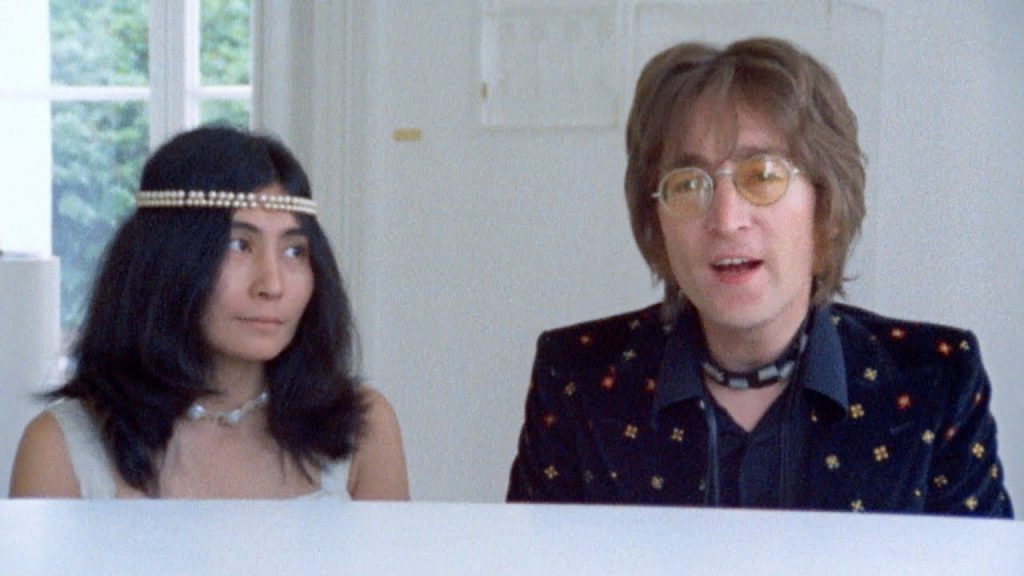
Critics called it the most expensive home movie ever made.
In order to promote the release of his new album, John Lennon and wife Yoko Ono collaborated in 1971 on the filming of an 81-minute “rockumentary.”
The film opens with John and Yoko strolling through a bank of fog enveloping their wooded estate in Tittenhurst Park, an hour’s drive west of London. They enter the front door of their mansion as the first chords of the album’s title song, Imagine, begin to play. John sits down at a white grand piano in a large, dimly lit room. Yoko walks slowly from window to window, opening shutters that progressively flood the all-white room with light. Then she joins him at the piano.
In the days before MTV, this was heady stuff.
Imagine, Lennon’s first major hit after his departure from the Beatles the previous year, catapulted him to stardom as a solo artist. The song has since become known as the “international anthem of atheism.” Lennon asks his listeners to imagine a world in which there is peace, harmony, and equality – all without the restrictions of class, religion, and political ideology:
Imagine there’s no heaven, it’s easy if you try
No hell below us, above us only sky
Imagine all the people living for today…Aha-ah…
Imagine there’s no countries, it isn’t hard to do
Northing to kill or die for, and no religion, too
Imagine all the people living life in peace… You…
You may say I’m a dreamer, but I’m not the only one
I hope someday you’ll join us, and the world will be as one
Imagine no possessions, I wonder if you can
No need for greed or hunger, a brotherhood of man
Imagine all the people sharing all the world…
You may say I’m a dreamer, but I’m not the only one
I hope someday you’ll join us, and the world will be as one
The song has been covered by hundreds of other artists around the world. For the last decade and a half it has been played just before the New Year’s Eve Times Square Ball descends in New York City, beckoning the gathered masses to yearn for a new year that will bring us closer to Lennon’s dream. If only we can get rid of the soul-crushing modern social order – including walls and barbed wire between nations, Haves vs. Have Nots, and the mindless dogma of religious hypocrites.
Growing up, Lennon had been disillusioned by the Church of England. In a 1966 interview, during the heyday of the Beatles, he openly rejected Christianity:
“It will vanish and shrink. I needn’t argue about that, I know I’m right, and I will be proved right. We’re more popular than Jesus now. I don’t know which will go first – rock ‘n’ roll or Christianity. Jesus was all right but his disciples were thick and ordinary. It’s them twisting it that ruins it for me.”
In between the breakup of the Beatles and the release of Imagine, Lennon recorded an album that included a song called God. After reciting a long list of things he doesn’t believe in, he shouts, “I don’t believe in Beatles!”
Then he whispers, “I just believe in me. Yoko and me. And that’s reality.”
Despite the gentle tones and hopeful spirit of Imagine, critics quickly pointed out something rather obvious: John Lennon’s “home movie” was stunningly hypocritical.
The songwriter who lives in a luxury mansion on a secluded, 72-acre estate calls for the end of private property – but apparently not just yet. The guy who asks us to “imagine there’s no possessions” has a private swimming pool and is driven around in a Rolls-Royce – but he’s not rushing to hand over the keys.
In his book Dominion: How the Christian Revolution Remade the World, historian Tom Holland points out that Lennon’s most famous song is fundamentally Christian in spirit and origin.
Holland is not a person of faith, so he doesn’t have an axe to grind. But he notes that the longing for a better world and a better humanity is not a pagan idea. Nor is it the legacy of Eastern religions. Nor is it one of the doctrines of Darwinists – for whom the world is a win/lose battle for survival – or of atheist philosophers like Friedrich Nietzsche, whom Holland believes would “turn over in his grave” if he heard Lennon’s warm invitation to imagine everyone living in peace.
Historically, the vision of a new world – where human dignity and equal rights are extended to both great and small – did not originate with the French Revolution, the Enlightenment, or the Declaration of Independence. It is the dream of those who follow Jesus – a dream that goes all the way back to their sourcebook, the Bible.
Lennon was right: Jesus’ followers tend to be “thick and ordinary.” We get so many things wrong.
Whenever progressives rail against bigotry, injustice, and resistance to change, Christians appear to be roadblocks to societal transformation. But as Holland points out, the very idea of societal transformation comes from the Jesus Movement. The hopefulness of a song like Imagine, in other words, doesn’t spring from a no-God view of the universe, but from the deep well of Christian tradition.
It’s no surprise that Lennon’s 1966 interview stirred up a tornado of protest. But in all the furor, people tended to forget that the Beatles’ lead guitarist had spoken these four words: “Jesus was all right…”
That’s actually the conviction of many Christians. Jesus is all right…but boy, his followers can sure be disappointing.
Is there something in this world worth imagining?
Of course.
Imagine what things would be like if we earnestly believed that God is committed to transforming everything.
And that if we didn’t settle for being thick and ordinary, he could do amazing things through us even today.
